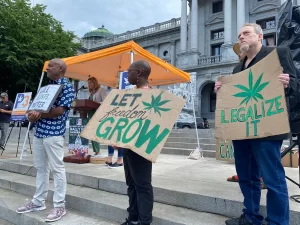The world of cannabis regulation in the United States is evolving at a fast rate, with significant changes on the horizon that could reshape the industry. Recent developments include the Justice Department’s proposal to reclassify marijuana from a Schedule I to a Schedule III substance and the introduction of a comprehensive federal legalization bill in Congress. These changes are groundbreaking not just for the marijuana industry but also for hemp stores nationwide. This blog explores what these changes mean for hemp retailers, delving into regulatory adjustments, market opportunities, taxation, social equity, and legal consistency.
The Reclassification of Marijuana: A Game-Changer towards Federal Marijuana Legalization

One of the most significant recent developments is the U.S. Department of Justice’s move to reschedule marijuana under the Controlled Substances Act (CSA). Since the CSA’s inception in 1970, marijuana has been classified as a Schedule I drug, alongside other illegal substances like heroin, which are deemed to have no accepted medical use and a high potential for abuse. However, a proposed rulemaking process initiated in May 2024 aims to reclassify marijuana as a Schedule III drug, a category that includes substances like anabolic steroids and ketamine, which have accepted medical uses but still carry some risk of abuse (Justice Gov).
This reclassification marks a monumental shift in federal marijuana policy, recognizing its medicinal value and paving the way for broader acceptance and legal use. This change could have profound implications for Hemp stores. While hemp products are derived from cannabis plants containing less than 0.3% THC (the psychoactive component), the reclassification of marijuana could lead to stricter federal oversight of all cannabis products, including hemp.
Navigating FDA Oversight: New Regulatory Landscape

As part of the broader federal legalization efforts, the proposed bill in Congress seeks to establish the Food and Drug Administration (FDA) as the primary regulatory authority for cannabis products. This would include not only marijuana but also hemp products, which are currently regulated more loosely under the 2018 Farm Bill. Under the new framework, hemp stores would need to adhere to stricter manufacturing, marketing, and labeling requirements set forth by the FDA (Marijuana Moment).
For hemp store owners, this means a need for greater vigilance in compliance. The FDA’s involvement could lead to more rigorous standards for product safety, quality and transparency. Hemp retailers might need to invest in better quality control measures and more detailed labeling practices to meet these new federal standards. While this could increase operational costs, it could also enhance consumer trust and expand the market by legitimizing hemp products in the eyes of more cautious consumers.
Market Expansion: Opportunities and Challenges
Federal legalization of marijuana could significantly expand the market for hemp stores. As cannabis becomes legally accessible, consumer interest in related products, such as hemp-derived CBD, could increase. The overlap between marijuana and hemp consumers is substantial, with many users seeking the therapeutic benefits of both products. This growing consumer base could lead to increased sales and a broader product offering in hemp stores (Marijuana Moment, Home).
However, with this market expansion comes increased competition. As marijuana becomes more mainstream, traditional hemp stores may face competition from marijuana dispensaries that also offer hemp-derived products. To stay competitive, hemp stores may need to differentiate their products through quality, unique offerings, or superior customer service. Additionally, as the market expands, it may attract larger, more well-funded businesses, making it more challenging for smaller hemp stores to compete.
Taxation: Preparing for Federal Cannabis Taxes
The proposed federal bill includes a provision for a federal tax on cannabis sales, which would gradually increase over several years. The tax would start at 10% and eventually rise to 25%, with small cannabis producers eligible for a 50% tax reduction on their first $20 million in sales annually (Marijuana Moment). For hemp stores, this could mean higher operational costs, especially if hemp products with THC are subject to the same federal tax as marijuana.
Hemp stores will need to account for these potential tax increases in their pricing strategies. While Bigger companies might take on these costs more easily, smaller businesses could feel the pinch. However, the tax credits available to small producers could provide some relief, allowing them to remain competitive in a growing market.
Social Equity Initiatives: Support for Disadvantaged Communities

One of the most progressive aspects of the proposed federal legalization bill is its focus on social equity. The bill includes provisions to expunge non-violent marijuana offenses and create grant programs to support communities disproportionately affected by the war on drugs. These grants would fund services like job training, legal aid, and small business loans, specifically targeting individuals from historically marginalized communities (Marijuana Moment).
For hemp stores, especially those owned by individuals from these communities, these initiatives could provide valuable support. Access to grants and loans could help small hemp businesses grow, expand their operations, and compete in an increasingly crowded market. Additionally, the focus on expungement and social equity could help repair some of the historical harms caused by cannabis criminalization, creating a more inclusive and diverse industry.
Legal Consistency: Harmonizing State and Federal Laws
One of the most frustrating challenges for hemp store owners has been navigating the inconsistent legal landscape between federal and state governments. While hemp was legalized federally under the 2018 Farm Bill, marijuana on a federal level still remains illegal at the federal level, despite many states are now legal. This inconsistency has led to a botch job of regulations that are different from state to state, creating legal uncertainty for hemp businesses (Home).
The proposed federal legalization bill aims to harmonize these laws, bringing federal regulations in line with state laws where marijuana is already legal. For hemp stores, this could simplify operations, reducing the risk of legal challenges and making it easier to do business across state lines. This consistency could also encourage investment in the hemp industry, as businesses would face less regulatory uncertainty.
Conclusion: Preparing for the Future

The federal landscape for cannabis, including hemp, is on the brink of transformation. As marijuana moves closer to reclassification and potential federal legalization, hemp stores across the country must prepare for the changes ahead. While these shifts present challenges—such as stricter regulations, potential tax increases, and increased competition—they also offer significant opportunities. An expanded market, greater consumer trust, and support for social equity initiatives could all contribute to the growth and success of hemp businesses in this new era.
For hemp store owners, now is the time to stay informed, invest in compliance, and explore ways to differentiate their products and services. By adapting to the changing regulatory environment and seizing the opportunities presented by federal legalization, hemp stores can position themselves for success in the evolving cannabis industry.









